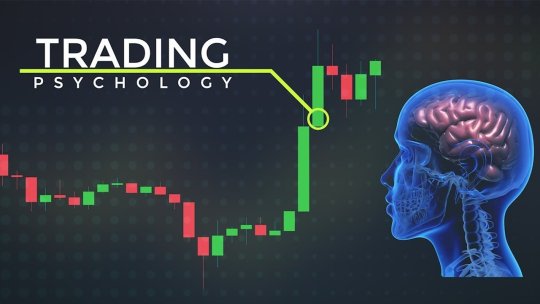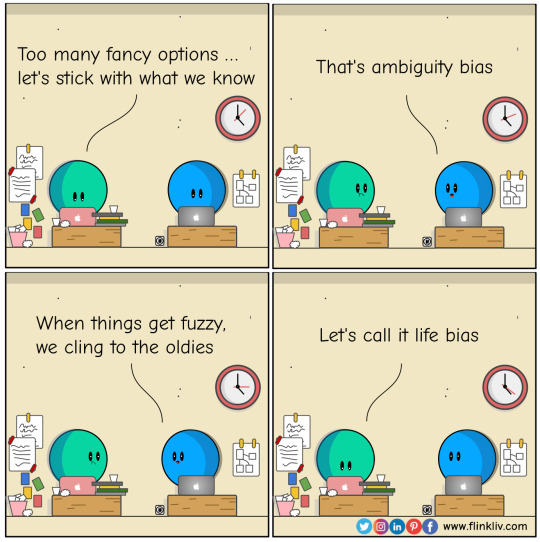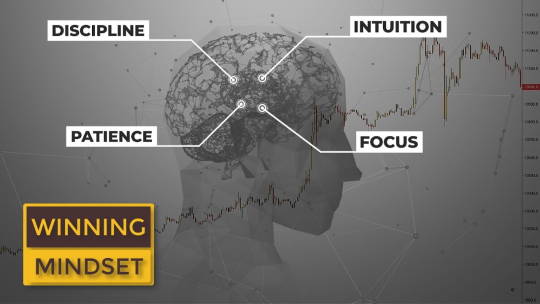#cognitivebiases
Text
youtube
#foolish#foolishness#cognitivebias#cognitivebiases#overconfidence#oversmart#psychologicalfacts#stupid#stupidity#Youtube
2 notes
·
View notes
Text
Emotional blind spots.
Emotional blind spots refer to areas in our emotional landscape where we may lack self-awareness or understanding. These blind spots can prevent us from recognizing, processing, or effectively dealing with certain emotions or aspects of our emotional lives. They can manifest in various ways:
Repression: Certain emotions or experiences may be repressed or pushed into the subconscious due to discomfort or fear.
Denial: People might deny certain emotions exist within them, especially if those emotions are perceived as negative or conflicting with their self-image.
Projection: Sometimes, we project our own unresolved emotions onto others, attributing those feelings to them instead of recognizing them within ourselves.
Rationalization: We may rationalize or intellectualize our emotions, dismissing or explaining them away rather than truly acknowledging and addressing them.
Overcompensation: In an attempt to avoid confronting uncomfortable emotions, some individuals may overcompensate by adopting certain behaviours or attitudes to mask or distract from their true feelings.
Cognitive biases: Our cognitive biases can create blind spots, influencing how we perceive and interpret emotional stimuli.
Addressing emotional blind spots typically involves developing self-awareness through introspection, therapy, or feedback from trusted individuals. It requires a willingness to explore uncomfortable emotions and experiences and a commitment to honesty and vulnerability with oneself. By shining a light on these blind spots, individuals can better understand themselves and improve their emotional well-being and relationships. I have high alexithymic traits. So don't be so hard on yourself.
#EmotionalBlindSpots#SelfAwareness#EmotionalIntelligence#MentalHealth#PsychologicalAwareness#EmotionalAwareness#PersonalGrowth#Introspection#TherapyInsights#CognitiveBiases#HiddenEmotions#DenialPatterns#EmotionalUnderstanding#RelationshipChallenges#InterpersonalSkills#VulnerabilityJourney#HonestSelfReflection#EmotionalProcessing#MindfulLiving#PsychologicalBarriers#today on tumblr#new blog
0 notes
Text
The Intricacies of Deceit: A Review of "The Folly of Fools" by Robert Trivers
The Intricacies of Deceit: A Review of "The Folly of Fools" by Robert Trivers
“The Folly of Fools: The Logic of Deceit and Self-Deception in Human Life” by Robert Trivers is a compelling exploration of the intricate dynamics of deceit and self-deception in human behavior. Trivers, a renowned evolutionary biologist, delves into the evolutionary roots of deception and its pervasive presence in various aspects of human life.
Key Takeaways:
Evolutionary Perspective:
Trivers…

View On WordPress
#CognitiveBiases#DeceitAndSelfDeception#EvolutionaryLogic#HumanBehavior#PracticalWisdom#RationalDecisionMaking#RelationshipInsights#SocialInteractions#SocietalImplications#TriversBookReview
0 notes
Video
youtube
HOW TO MANIPULATE AND PERSUADE ANYONE: THE ULTIMATE GUIDE
#ManipulationAndPersuasion #UltimateGuide #BuildingRapportAndTrust #UnderstandingHumanPsychology #EffectiveCommunicationTechniques #InfluencingTechniques #EthicalConsiderations #WinWinApproach #PsychologicalPrinciples #CognitiveBiases
#youtube#ManipulationAndPersuasion#UltimateGuide#ultimate guide#BuildingRapportAndTrust#UnderstandingHumanPsychology#effectivecommunicationtechniques#InfluencingTechniques#ethicalconsiderations#WinWinApproach#psychologicalprinciples#cognitivebiases#cognitive biases
0 notes
Text
Mind Over Money: Unraveling the Psychological and Economic Factors Influencing Financial Decisions
In the intricate world of finance, understanding the psychological factors that influence our decisions is as crucial as knowing the numbers. The interplay between psychology, economics, and individual financial choices forms a complex web that can either lead to success or downfall. This article delves into the cognitive biases, emotions, technical analysis tools, and the global macroeconomic…
View On WordPress
#BehavioralEconomics#CognitiveBiases#EconomicInsights#EmotionalInvesting#FinancialGuidance#financialliteracy#FinancialPsychology#FinancialWellBeing#GlobalEconomics#InvestmentDecisions#InvestmentStrategies#MacroeconomicTrends#MindOverMoney#My-Financials.com#PersonalFinance#TechnicalAnalysis
0 notes
Text
The Psychology of Trading: Controlling Emotions for Success

Navigating the Complex Intersection of Emotions and Rationality in the World of Trading
By Amir Shayan
Trading in financial markets is a dynamic and complex endeavor that goes beyond the realm of numbers and charts. While technical and fundamental analyses play a crucial role, the psychology of trading is equally significant. The human mind, with its array of emotions and cognitive biases, can either be a trader's greatest asset or their most formidable challenge. In this comprehensive guide, we will explore the intricate world of trading psychology, the impact of emotions on trading decisions, and strategies to master the art of emotional control for consistent success in the markets.
Table of Contents
- Introduction
- The Emotional Rollercoaster of Trading
- Understanding Cognitive Biases
- Fear and Greed: The Twin Emotions of Trading
- Overcoming Fear: Rational Decision-Making
- Managing Greed: Setting Realistic Goals
- The Role of Patience and Discipline
- The Dangers of Revenge Trading
- Building a Robust Trading Plan
- Implementing Risk Management Strategies
- Mindfulness and Emotional Regulation Techniques
- Practicing Psychological Resilience
- Learning from Mistakes: A Growth Mindset
- The Power of Positive Self-Talk
- Seeking Professional Support
- Conclusion
Introduction
Trading, often considered a battle between logic and emotion, requires a delicate balance. While analysis provides insights, it's the emotional aspect that determines the execution and management of trades. Understanding and mastering trading psychology is vital for consistent success in the financial markets.
The Emotional Rollercoaster of Trading
The journey of a trader is marked by highs and lows, excitement, anxiety, and the thrill of potential gains. These emotions can lead to impulsive decisions if not kept in check. Recognizing these emotional patterns is the first step towards controlling them.
Understanding Cognitive Biases
Cognitive biases are innate tendencies of the human mind to think and act in certain ways. Biases like confirmation bias, where traders seek information that aligns with their beliefs, can impact decision-making. Being aware of these biases helps traders make more objective choices.
Fear and Greed: The Twin Emotions of Trading
Fear and greed are arguably the most powerful emotions influencing trading decisions. Fear can lead to missed opportunities, while greed can result in taking excessive risks. Recognizing these emotions and their impact is crucial for effective decision-making.
Overcoming Fear: Rational Decision-Making
Fear often stems from the fear of loss. Rational decision-making involves analyzing the potential risk and reward of a trade objectively. Creating a solid trading plan and sticking to it can help mitigate fear-based decisions.
Managing Greed: Setting Realistic Goals
Greed can lead to chasing after unrealistic profits, often resulting in losses. Setting clear and achievable goals helps manage expectations and prevents traders from making impulsive decisions driven by the desire for quick gains.
The Role of Patience and Discipline
Patience is a virtue in trading. Waiting for optimal setups and not succumbing to the temptation of overtrading is essential. Discipline ensures that trades are executed according to plan, even when emotions are running high.
The Dangers of Revenge Trading
Revenge trading, driven by frustration or anger after a loss, can lead to a cycle of more losses. Traders must recognize when they are in a negative emotional state and step away from the market to avoid making irrational decisions.
Building a Robust Trading Plan
A well-structured trading plan outlines entry and exit strategies, risk management, and goals. Following a plan reduces the impact of emotions during trading and provides a structured framework for decision-making.
Implementing Risk Management Strategies
Risk management is a cornerstone of trading psychology. Setting stop-loss orders and determining position sizes based on a percentage of the trading capital helps protect against substantial losses.
Mindfulness and Emotional Regulation Techniques
Practicing mindfulness can help traders stay present in the moment and avoid making impulsive decisions based on emotions. Techniques such as deep breathing and meditation can aid in emotional regulation.
Practicing Psychological Resilience
Trading involves facing losses and setbacks. Developing psychological resilience allows traders to bounce back from losses, learn from mistakes, and continue trading with a positive mindset.
Learning from Mistakes: A Growth Mindset
Mistakes are valuable learning opportunities. Adopting a growth mindset, where failures are seen as stepping stones to improvement, helps traders remain resilient and motivated.
The Power of Positive Self-Talk
Positive self-talk involves using constructive and affirming language to boost confidence and manage negative emotions. It can enhance a trader's self-belief and decision-making abilities.
Seeking Professional Support
Trading psychology can be challenging to navigate alone. Professional help, such as working with a trading coach or therapist, can provide valuable insights and strategies to manage emotions effectively.
Conclusion
Mastering trading psychology is an ongoing journey that requires self-awareness, discipline, and continuous effort. Traders who invest time and energy into understanding their emotions and developing strategies to manage them are better equipped to make rational decisions and achieve consistent success in the markets.
In conclusion, the psychology of trading is an intricate dance between emotions, cognitive biases, and disciplined decision-making. Acknowledging the role of emotions, understanding their impact, and implementing strategies to manage them are essential steps for traders seeking long-term success. By recognizing the psychological pitfalls and learning to control emotional responses, traders can navigate the complexities of the financial markets with confidence and resilience.
Read the full article
#cognitivebiases#Disciplineintrading#emotionalcontrol#Emotionalregulation#emotionsintrading#Overcomingfearandgreed#successfultrading#tradermindset#Tradingpsychology#tradingstrategies
0 notes
Text
Summary of "Thinking, Fast and Slow" by Daniel Kahneman
“Thinking, Fast and Slow” by Daniel Kahneman is a groundbreaking exploration of human cognition and decision-making. Kahneman, a Nobel laureate in economics, presents the two systems of thinking that influence our judgments and choices. System 1 operates automatically and instinctively, while System 2 is deliberate and reflective. This summary provides an overview of the key concepts and…

View On WordPress
#BehavioralEconomics#CognitiveBiases#CognitiveIllusions#DanielKahneman#DecisionMaking#Heuristics#System1Thinking#System2Thinking#ThinkingFastAndSlow#Psychology
0 notes
Text
Rap battle: William Faulkner competes against H.D.. Auguste Renoir is the judge.
Judge Renoir: Alright, alright, settle down now. Today we’ve got a very interesting topic for our rap battle. We’ll be discussing the Representativeness Heuristic. Representativeness what? You might ask. Well, let our rappers clarify that for you. Our first competitor is the legendary author William Faulkner. Faulkner, give us your take on the heuristic.
Faulkner: (clears throat) Let me break it…

View On WordPress
#CognitiveBiases#HD#JudgeRenoir#Judgment#RapBattle#RepresentativenessHeuristic#Stereotypes#WilliamFaulkner
0 notes
Link
#anchoringbias#behavioraleconomics#behavioralinsights#biasesineconomics#choicearchitecture#cognitivebiases#decisionmaking#economicbehavior#economicdecisions#economicinsights#economicmodels#economicoutcomes#economicstrategies#framingeffect#humanbehavior#lossaversion#nudging#prospecttheory#psychologyandeconomics#rationality
0 notes
Text
"The Psychology of Choice"
“The Psychology of Decision-Making: Unraveling the Threads of Choice”
Introduction: Decision-making is a complex tapestry woven from the threads of psychology, influenced by various factors that shape the choices we make. This article unravels the intricate psychology behind decision-making, shedding light on the threads that guide our choices and exploring the fascinating interplay of cognitive…
View On WordPress
0 notes
Text
The Dual Forces of Thought: A Review of "Thinking, Fast and Slow" by Daniel Kahneman
The Dual Forces of Thought: A Review of "Thinking, Fast and Slow" by Daniel Kahneman
“Thinking, Fast and Slow” by Daniel Kahneman is a groundbreaking exploration of the two systems that govern human thought processes. The Nobel laureate delves into the realms of fast, intuitive thinking (System 1) and slow, deliberate thinking (System 2), unraveling the complexities of decision-making and cognitive biases that shape our perceptions of the world.
Key Takeaways:
Dual Systems of…

View On WordPress
#BehavioralEconomics#CognitiveBiases#DecisionMaking#DualThinking#HindsightBias#KahnemanInsights#Metacognition#Overconfidence#ProspectTheory
1 note
·
View note
Video
youtube
POWERFUL DARK PSYCHOLOGY TRICKS #manipulationtactics #mind #darkpsychology #manipulation
#youtube#DarkPsychologyTricks#manipulationtechniques#cognitivebiases#cognitive biases#ResistingManipulation#informeddecisionmaking#darkpsychology#dark psychology#manipulation
0 notes
Link
The Power Of Cognitive Biases In Your Marketing - https://www.pixelproductionsinc.com/cognitive-biases-in-your-marketing/
0 notes
Text


Read more: https://flinkliv.com/pages/cognitive-bias.html
#cognitivebiases #ambiguousBias #decisionmaking #a11y #flinkliv #criticalthinking #kognitivskjevhet #beslutningstaking #kritisktenkning
0 notes
Text
The Psychology of Trade: Understanding the Mindset of Successful Traders

Unveiling the Inner Workings of Successful Traders: Exploring the Psychology of Trade
By Amir Shayan
Trading in financial markets is not solely about analyzing charts, studying trends, and making calculated decisions. It is also about understanding the psychology behind successful trading. The human mind plays a critical role in trading, and emotions, biases, and cognitive factors can significantly impact the outcome of trades. In this article, we delve into the fascinating world of the psychology of trade, exploring the mindset of successful traders and the psychological factors that influence their decision-making process. By understanding these psychological aspects, traders can gain an edge in the market and enhance their trading performance. So, let's embark on a journey to unravel the mysteries of the human mind in the context of trading.
- The Emotional Rollercoaster of Trading:
Trading is an emotional rollercoaster ride. Fear, greed, and excitement are common emotions experienced by traders. Successful traders understand how to manage and control these emotions to avoid impulsive and irrational decisions. We explore the impact of emotions on trading and discuss strategies to maintain emotional balance in the face of market volatility.
- Cognitive Biases: Unconscious Influences on Decision Making:
Cognitive biases are inherent shortcuts in the human brain that can lead to biased judgments and decision-making. Traders need to be aware of these biases to avoid falling into common traps. We examine popular cognitive biases such as confirmation bias, anchoring bias, and availability bias, and provide insights on how to overcome them.
- Developing a Winning Mindset:
A winning mindset is crucial for traders to navigate the ups and downs of the market. We delve into the traits and characteristics exhibited by successful traders, including discipline, patience, resilience, and adaptability. By cultivating these qualities, traders can develop a mindset that aligns with long-term success.
- The Role of Risk Management:
Risk management is a vital aspect of trading psychology. Successful traders understand the importance of setting risk parameters and implementing effective risk management strategies. We explore the psychology behind risk management and provide practical tips for traders to protect their capital and minimize losses.
- Overcoming Trading Psychology Challenges:
Traders often face psychological challenges that can hinder their performance. We address common issues such as fear of missing out (FOMO), revenge trading, and overtrading. By understanding these challenges and implementing appropriate techniques, traders can overcome psychological obstacles and improve their decision-making process.
- Building Confidence and Discipline:
Confidence and discipline are essential attributes of successful traders. We discuss strategies for building confidence in trading abilities and maintaining discipline in following trading plans and strategies. Additionally, we explore techniques to overcome self-doubt and develop a resilient mindset.
- The Role of Mindfulness and Mental Well-being:
Trading can be a stressful endeavor, and mental well-being is crucial for sustained success. We highlight the benefits of mindfulness practices in trading and provide tips for managing stress, staying focused, and maintaining a healthy work-life balance.
- Seeking Professional Help:
In some cases, traders may benefit from seeking professional help to address psychological challenges. We discuss the role of trading psychologists and coaches and how they can assist traders in improving their mindset and performance.
Conclusion:
The psychology of trade is a fascinating field that unveils the inner workings of the human mind in the context of trading. Successful traders understand the importance of psychology and work on developing a mindset that aligns with long-term success. By managing emotions, overcoming cognitive biases, and cultivating discipline and resilience, traders can enhance their decision-making process and improve their trading performance. Remember, trading is not just about numbers; it is about understanding yourself and the psychological factors that impact your trading decisions. By delving into the psychology of trade, you can gain a deeper understanding of the mindset of successful traders and apply these insights to your own trading journey.
Read the full article
#cognitivebiases#decisionmaking#discipline#emotionalintelligence#mindfulnessintrading#mindsetoftraders#psychologyofinvesting#Riskmanagement#Tradingpsychology#tradingstrategies
0 notes
Text
Tweeted
Participants needed for online survey! Topic: "Cognitive Biases in Investing" https://t.co/SzM0UJCkqH via @SurveyCircle #investing #behaviour #biases #confidence #CognitiveBiases #investor #survey #surveycircle https://t.co/OmVpJ6ugMO
— Daily Research @SurveyCircle (@daily_research) Jan 30, 2023
0 notes